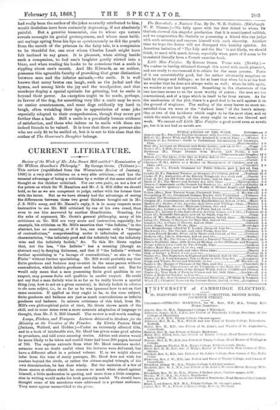CURRENT LITERATURE.
Review of the Work of Mr. John Stuart Mill entitled "Examination of Sir William Hamilton's Philosophy." By George Grote. (Triibner.)— This review (republished from the Westminster Review of January, 1866) is a very able criticism on a very able criticism,—and has the unusual advantage of being a criticism by a writer of the same school of thought as the thinker criticized. For our own parts, on not a few of the points on which Sir W. Hamilton and Mr. J. S. Mill differ we should hold, so far as we are competent to judge, rather with the former than with the latter. But as we have already had the advantage of seeing the differences between these two great thinkers brought out in Mr. -T. S. Mill's essay, and Mr. Manses reply, it is in many respects more Instructive to see Mr. Mill criticized by one of his own creed, than even to see him answered by another Hamiltonian. Granting, for the sake of argument, Mr. Grote's general philosophy, many of his criticisms on Mr. Mill are very acute and instructive, especially, for example, his criticism on Mr. Mill's assertion that "the Infinite," in the abstract, has no meaning, or if it has, can express only a "farrago 'of contradictions," comprehending under it infinitudes of opposite characteristics, "the infinitely good and the infinitely bad, the infinitely wise and the infinitely foolish," ezc. To this Mr. Grote replies that, not the less, "the Infinite" has a meaning (though an abstract one) in denying finiteness, and that if "the Infinite" without further specializing is "a farrago of contradictions," so also is "the Finite" without further specializing. Mr. Mill would probably say that finite goodness and badness may co-exist in the same person without contradiction, which infinite goodness and badness could not. But he would only mean that a man possessing finite good qualities in one respect, may possess finite evil qualities in another respect. He could not say that a man finitely wise in so far as he really knows a special thing (say, how to act on a given occasion), is finitely foolish in relation to the same subject, i.e., in so far as he was ignorant how to act on that same occasion. If applied as they ought to be, to the scone subject, finite goodness and badness are just as much contradictions as infinite goodness and badness. In minute criticisms of this kind, from Mr. Mill's own philosophical point of view, Mr. Grote shows much of the skill, and in some sense even a more accurate adaptation of language to thought, than Mr. J. S. Mill himself. The review is well worth reading.






























 Previous page
Previous page